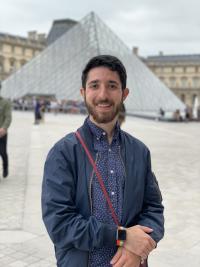You are here
Hale Stolberg
American University
AIP FYI Science Policy Communications Intern
American Institute of Physics
Final presentation
![]() Hale-Stolberg-SPS-Final-Presentation.pdf
Hale-Stolberg-SPS-Final-Presentation.pdf
This presentation is styled in the format of a TED Talk and will connect the need for undergraduates in physics and the sciences to be engaged in politics and policy with my experience working with FYI: Science Policy News from AIP. In this presentation, I will discuss the need for scientists to be proficient communicators, how engagement with the policy process hones this skill, and how I personally have worked through my time with FYI. I will also discuss how policy can impact undergraduate physics majors and scientists, as well as my own experience covering those policies through FYI. I will conclude my presentation by discussing what undergraduates can do to begin engaging in policy and politics.
I am a rising senior at American University in Washington, DC and will receive my bachelor’s in physics with a minor in public administration and policy this December. When not in class, you can find me working a multitude of jobs including as a Creative and Technical Specialist (CaTS) at the Design and Build Lab, AU’s rapid prototyping facility, and this last semester as an intern at NASA Headquarters. Outside of school or work, I enjoy spending time on my bike, exploring DC’s museums, or having the odd political debate with my friends.
My path to physics was not a straightforward one. I’ve always known I’ve wanted to be a scientist. I specifically remember watching the PBS program NOVA and being enthralled watching what scientists do on a daily basis. The scientists that I saw on TV were able to explore and discover the universe by asking questions and seeking answers. From then on, I knew I’d be a scientist when I grew up. But as it turns out, my brain seems to be unsatisfied pursuing just one subject. In high school, I was alternately intrigued by chemistry, energy and environmental sciences, anthropology, and even architecture and urban design. But what I really loved was politics and policy. To me, science and politics aren’t that different. They are both systems we use to solve big problems. Combining these two passions then seemed like the obvious choice.
I’m really excited to continue working at the intersection of science and policy. While staying at home may not be the summer I had in mind, I am so grateful for everyone at SPS for being so diligent, and continuing to make this program a reality.

